Andy Ray’s Ten Best Films of 2023
2023 was the best year for films so far this decade. In fact, save for Paul Thomas Anderson’s 2021 feature “Licorice Pizza,” this year’s three best films were the best of the 2020s. Hollywood can safely say its Covid pandemic lull is now behind us. So, let’s jump right in and review the best of 2023:
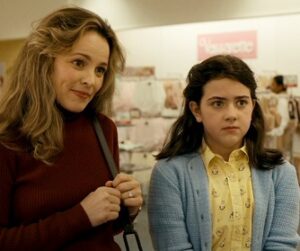 Kelly Freemon Craig’s faithful adaptation of Judy Blume’s classic coming-of-age novel “Are You There, God? It’s Me, Margaret” was not as strong as her 2016 debut, “The Edge of Seventeen,” but it obviously covers similar material. This presentation of the difficult middle school years features girls running through a backyard sprinkler one minute, then discussing their breast sizes and forthcoming first periods the next. Rachel McAdams turns in the film’s best performance as the title character’s surprisingly involved mother. And I say “surprisingly” because parents are often non-existent in films featuring teens. My only issue is that the Margaret character is simply reactive to the thoughts and ideas of those around her; she rarely initiates any activity on her own. This is a function of the source material, of course, but I believe it hinders the progression of the narrative.
Kelly Freemon Craig’s faithful adaptation of Judy Blume’s classic coming-of-age novel “Are You There, God? It’s Me, Margaret” was not as strong as her 2016 debut, “The Edge of Seventeen,” but it obviously covers similar material. This presentation of the difficult middle school years features girls running through a backyard sprinkler one minute, then discussing their breast sizes and forthcoming first periods the next. Rachel McAdams turns in the film’s best performance as the title character’s surprisingly involved mother. And I say “surprisingly” because parents are often non-existent in films featuring teens. My only issue is that the Margaret character is simply reactive to the thoughts and ideas of those around her; she rarely initiates any activity on her own. This is a function of the source material, of course, but I believe it hinders the progression of the narrative.
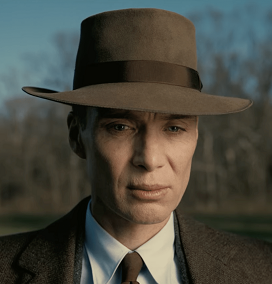 Christopher Nolan is a director typically more interested in spectacle than in developing interesting stories. This is why last summer’s “Oppenheimer” stands as his best effort yet. Adapted from a novel about the renowned physicist, “Oppenheimer” almost suffers from too much story. Indeed, Nolan could cut some of the plodding first hour and not lose a thing. Irish actor Cillian Murphy turns in the best performance of his career as the man known as the inventor of the atomic bomb. Emily Blunt is strong as his wife, and Robert Downey Jr. practically steals the show as U.S. Atomic Energy Commission Chairman Lewis Strauss, a man who harbors a grudge against Oppenheimer for initially suggesting the U.S. engage in nuclear arms talks with the Soviets. Driven to borderline madness, Downey essentially assumes the same role F. Murray Abraham inhabited in “Amadeus.”
Christopher Nolan is a director typically more interested in spectacle than in developing interesting stories. This is why last summer’s “Oppenheimer” stands as his best effort yet. Adapted from a novel about the renowned physicist, “Oppenheimer” almost suffers from too much story. Indeed, Nolan could cut some of the plodding first hour and not lose a thing. Irish actor Cillian Murphy turns in the best performance of his career as the man known as the inventor of the atomic bomb. Emily Blunt is strong as his wife, and Robert Downey Jr. practically steals the show as U.S. Atomic Energy Commission Chairman Lewis Strauss, a man who harbors a grudge against Oppenheimer for initially suggesting the U.S. engage in nuclear arms talks with the Soviets. Driven to borderline madness, Downey essentially assumes the same role F. Murray Abraham inhabited in “Amadeus.”
 Martin Scorsese has directed so many excellent films, I suppose it’s debatable whether 2023’s “Killers of the Flower Moon” would make his top ten. Without going through the process of ranking his entire output, I venture to say this one does belong in the top tier of the Scorsese list. In his most intriguing film since 2013’s “Wolf of Wall Street,” “Flower Moon” has Scorsese regulars Robert DeNiro and Leonardo DiCaprio in a story of the mysterious early deaths of many members of Oklahoma’s native Osage people during the 1920s, after oil was discovered on their land. Ironically, the standout performance here belongs to relative newcomer Lily Gladstone as an Osage married to DiCaprio who finds her own health declining rapidly due to diabetes. Clocking in at a mammoth 3.5 hours, “Flower Moon” actually moves along at a pretty quick clip, although Scorsese could have cut some of the litany of Osage deaths from the middle hour to tighten up the proceedings.
Martin Scorsese has directed so many excellent films, I suppose it’s debatable whether 2023’s “Killers of the Flower Moon” would make his top ten. Without going through the process of ranking his entire output, I venture to say this one does belong in the top tier of the Scorsese list. In his most intriguing film since 2013’s “Wolf of Wall Street,” “Flower Moon” has Scorsese regulars Robert DeNiro and Leonardo DiCaprio in a story of the mysterious early deaths of many members of Oklahoma’s native Osage people during the 1920s, after oil was discovered on their land. Ironically, the standout performance here belongs to relative newcomer Lily Gladstone as an Osage married to DiCaprio who finds her own health declining rapidly due to diabetes. Clocking in at a mammoth 3.5 hours, “Flower Moon” actually moves along at a pretty quick clip, although Scorsese could have cut some of the litany of Osage deaths from the middle hour to tighten up the proceedings.
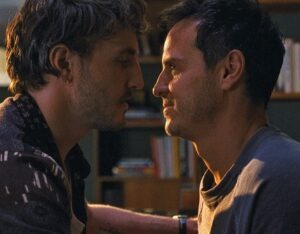 Andrew Haigh’s “All of Us Strangers” stars Andrew Scott as a mid-forties gay man unable to make personal connections with others until he deals with the death of his parents in an automobile accident 30 years prior. The unique structure of Haigh’s adapted screenplay is that Scott’s character is able to visit his parents in the house where he grew up. The parents (Jamie Bell and an excellent Claire Foy) appear exactly as they were the day they died. Absent a lot of dialogue (particularly given the premise), “All of Us Strangers” relies heavily on the close-up photography of cinematographer Jamie D. Ramsay, keeping the screenplay from getting “preachy,” which is common in all too many films. Not for everyone’s taste, this deliberately paced effort is something truly unique.
Andrew Haigh’s “All of Us Strangers” stars Andrew Scott as a mid-forties gay man unable to make personal connections with others until he deals with the death of his parents in an automobile accident 30 years prior. The unique structure of Haigh’s adapted screenplay is that Scott’s character is able to visit his parents in the house where he grew up. The parents (Jamie Bell and an excellent Claire Foy) appear exactly as they were the day they died. Absent a lot of dialogue (particularly given the premise), “All of Us Strangers” relies heavily on the close-up photography of cinematographer Jamie D. Ramsay, keeping the screenplay from getting “preachy,” which is common in all too many films. Not for everyone’s taste, this deliberately paced effort is something truly unique.
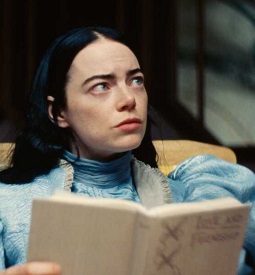 2023 was the year Yorgos Lanthimos directed what I believe to be his only worthwhile film so far – the weird but fascinating “Poor Things,” about a mad scientist (another brilliant supporting performance from the reliable Willem Dafoe) who reanimates a recently deceased woman by replacing her brain with that of her unborn baby. Emma Stone turns in her best performance since “La La Land” as the woman, able to speak Victorian English and understand complex scientific concepts, but unable to understand what we consider to be obvious social norms. This dichotomy provides some hilarious situations, but Lanthimos never goes overboard the way, say, Monty Python would have in processing similar material. Still too reliant on the grotesque and macabre, Lanthimos has succeeded in bringing us the most original film of the year. And shooting the entire film in a wide-angle lens is an excellent directorial choice, although I wish he would have stuck with his initial black-and-white photography throughout.
2023 was the year Yorgos Lanthimos directed what I believe to be his only worthwhile film so far – the weird but fascinating “Poor Things,” about a mad scientist (another brilliant supporting performance from the reliable Willem Dafoe) who reanimates a recently deceased woman by replacing her brain with that of her unborn baby. Emma Stone turns in her best performance since “La La Land” as the woman, able to speak Victorian English and understand complex scientific concepts, but unable to understand what we consider to be obvious social norms. This dichotomy provides some hilarious situations, but Lanthimos never goes overboard the way, say, Monty Python would have in processing similar material. Still too reliant on the grotesque and macabre, Lanthimos has succeeded in bringing us the most original film of the year. And shooting the entire film in a wide-angle lens is an excellent directorial choice, although I wish he would have stuck with his initial black-and-white photography throughout.
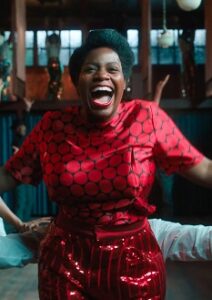 Although produced by Steven Spielberg, Blitz Bazawule’s “The Color Purple” isn’t a remake of Spielberg’s 1985 masterpiece, but rather a filmed adaptation of the Broadway musical. Featuring standout performances from Fantasia Barrino and Taraji P. Henson, “The Color Purple” is this year’s stand-up-and-cheer crowd-pleasing favorite. Due to its status as a musical, the evil nature of the lead character’s husband is somewhat muted in comparison to the Spielberg version; and that works well here. This adaptation highlights other story threads, and its positive treatment of religion is a welcome addition.
Although produced by Steven Spielberg, Blitz Bazawule’s “The Color Purple” isn’t a remake of Spielberg’s 1985 masterpiece, but rather a filmed adaptation of the Broadway musical. Featuring standout performances from Fantasia Barrino and Taraji P. Henson, “The Color Purple” is this year’s stand-up-and-cheer crowd-pleasing favorite. Due to its status as a musical, the evil nature of the lead character’s husband is somewhat muted in comparison to the Spielberg version; and that works well here. This adaptation highlights other story threads, and its positive treatment of religion is a welcome addition.
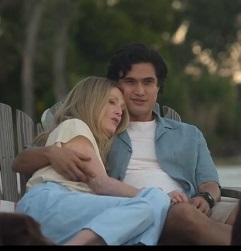 Todd Haynes’ heavy drama “May December” is another that’s not for everyone’s taste. But it stands out as one of this year’s best. Oscar winners Julianne Moore and Natalie Portman play a woman who created a scandal 20 years earlier by having an extramarital affair with a 13-year-old boy, and the Hollywood actress playing her in a new motion picture treatment of the one-time tabloid story. Relative newcomer Charles Melton turns in an excellent performance as the now-adult boy, who went on to marry the older woman and start a family with her. As the actress shadows the woman, the two somewhat meld into the same person, a la Ingmar Bergman’s film school classic “Persona.” If Haynes is reaching for the stars by emulating one of the most important films ever made, he’s up to the challenge. Even without the Bergman connection, “May December” stands out as a very, very strong achievement.
Todd Haynes’ heavy drama “May December” is another that’s not for everyone’s taste. But it stands out as one of this year’s best. Oscar winners Julianne Moore and Natalie Portman play a woman who created a scandal 20 years earlier by having an extramarital affair with a 13-year-old boy, and the Hollywood actress playing her in a new motion picture treatment of the one-time tabloid story. Relative newcomer Charles Melton turns in an excellent performance as the now-adult boy, who went on to marry the older woman and start a family with her. As the actress shadows the woman, the two somewhat meld into the same person, a la Ingmar Bergman’s film school classic “Persona.” If Haynes is reaching for the stars by emulating one of the most important films ever made, he’s up to the challenge. Even without the Bergman connection, “May December” stands out as a very, very strong achievement.
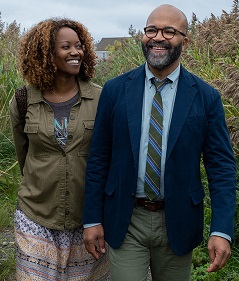 Cord Jefferson’s “American Fiction” is, on its surface, the story of an African American professor and author who writes a “street jive” black novel as a lark, which then becomes a huge best seller. Dig deeper though, and this is the story of a family experiencing sudden loss, a blossoming new relationship, and the declining health of its matriarch. The family story is so absorbing, the narrative thread about the best-selling novel almost becomes secondary. Veteran character actor Jeffrey Wright turns in the best performance of his career in the lead role. Save for an unsatisfying ending, “American Fiction” is one of this decade’s very best films.
Cord Jefferson’s “American Fiction” is, on its surface, the story of an African American professor and author who writes a “street jive” black novel as a lark, which then becomes a huge best seller. Dig deeper though, and this is the story of a family experiencing sudden loss, a blossoming new relationship, and the declining health of its matriarch. The family story is so absorbing, the narrative thread about the best-selling novel almost becomes secondary. Veteran character actor Jeffrey Wright turns in the best performance of his career in the lead role. Save for an unsatisfying ending, “American Fiction” is one of this decade’s very best films.
 Another of this decade’s best is Alexander Payne’s “The Holdovers,” in which the always reliable Paul Giamatti plays a curmudgeonly prep school professor assigned to babysit the boys unable to leave campus during the 1970-1971 Christmas break. Following Payne’s familiar structure as a road-trip buddy movie in which two antagonists draw closer together, newcomer Dominic Sessa holds his own against veteran actor Giamatti. And Da’Vine Joy Randolph is excellent as the campus cook who has recently lost her son in Vietnam. “The Holdovers” is not all happy, but it’s heartwarming throughout. Because it follows Payne’s typical framework, this film fits like a comfy pair of slippers. We kind of know where it’s going, but the thrill is getting there. “The Holdovers” immediately ranks with Payne’s “Sideways,” “The Descendants,” and “Nebraska” as another major accomplishment in his catalog.
Another of this decade’s best is Alexander Payne’s “The Holdovers,” in which the always reliable Paul Giamatti plays a curmudgeonly prep school professor assigned to babysit the boys unable to leave campus during the 1970-1971 Christmas break. Following Payne’s familiar structure as a road-trip buddy movie in which two antagonists draw closer together, newcomer Dominic Sessa holds his own against veteran actor Giamatti. And Da’Vine Joy Randolph is excellent as the campus cook who has recently lost her son in Vietnam. “The Holdovers” is not all happy, but it’s heartwarming throughout. Because it follows Payne’s typical framework, this film fits like a comfy pair of slippers. We kind of know where it’s going, but the thrill is getting there. “The Holdovers” immediately ranks with Payne’s “Sideways,” “The Descendants,” and “Nebraska” as another major accomplishment in his catalog.
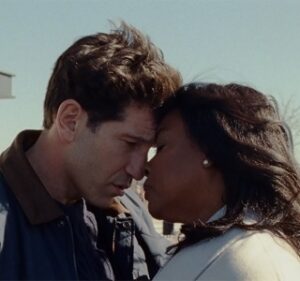 Ava DuVernay (“Selma”) instantly rises to the upper echelon of motion picture directors with her brilliant “Origin,” a narrative story about Pulitzer Prize winning author Isabel Wilkerson’s non-fiction work “Caste: The Origins of our Discontents,” which argues that American slavery was not so much a product of racism as it was a caste system of upper and lower classes. Wilkerson (played by Aunjanue Ellis-Taylor, in one of the year’s best acting achievements) equates slavery with Nazi Germany’s treatment of Jews and the plight of the Indian Dalits. It’s an interesting, and somewhat risky, thesis, given Wilkerson’s race. DuVernay interweaves the present-day story thread of Wilkerson’s research with one involving the personal tragedies in her own life (including the declining health of her mother and the sudden death of her white husband), as well as that of a young Nazi who falls in love with a Jewish girl during the time of Hitler. There’s a lot going on in “Origin,” but never does it become confusing or burdensome. Instead, this film makes us think – and think outside the proverbial box, to boot. Any preconceptions of race in America are turned upside down in this completely original, thought-provoking work. I believe “Origin” is this year’s best film.
Ava DuVernay (“Selma”) instantly rises to the upper echelon of motion picture directors with her brilliant “Origin,” a narrative story about Pulitzer Prize winning author Isabel Wilkerson’s non-fiction work “Caste: The Origins of our Discontents,” which argues that American slavery was not so much a product of racism as it was a caste system of upper and lower classes. Wilkerson (played by Aunjanue Ellis-Taylor, in one of the year’s best acting achievements) equates slavery with Nazi Germany’s treatment of Jews and the plight of the Indian Dalits. It’s an interesting, and somewhat risky, thesis, given Wilkerson’s race. DuVernay interweaves the present-day story thread of Wilkerson’s research with one involving the personal tragedies in her own life (including the declining health of her mother and the sudden death of her white husband), as well as that of a young Nazi who falls in love with a Jewish girl during the time of Hitler. There’s a lot going on in “Origin,” but never does it become confusing or burdensome. Instead, this film makes us think – and think outside the proverbial box, to boot. Any preconceptions of race in America are turned upside down in this completely original, thought-provoking work. I believe “Origin” is this year’s best film.
Andy Ray‘s reviews also appear on https://townepost.com/